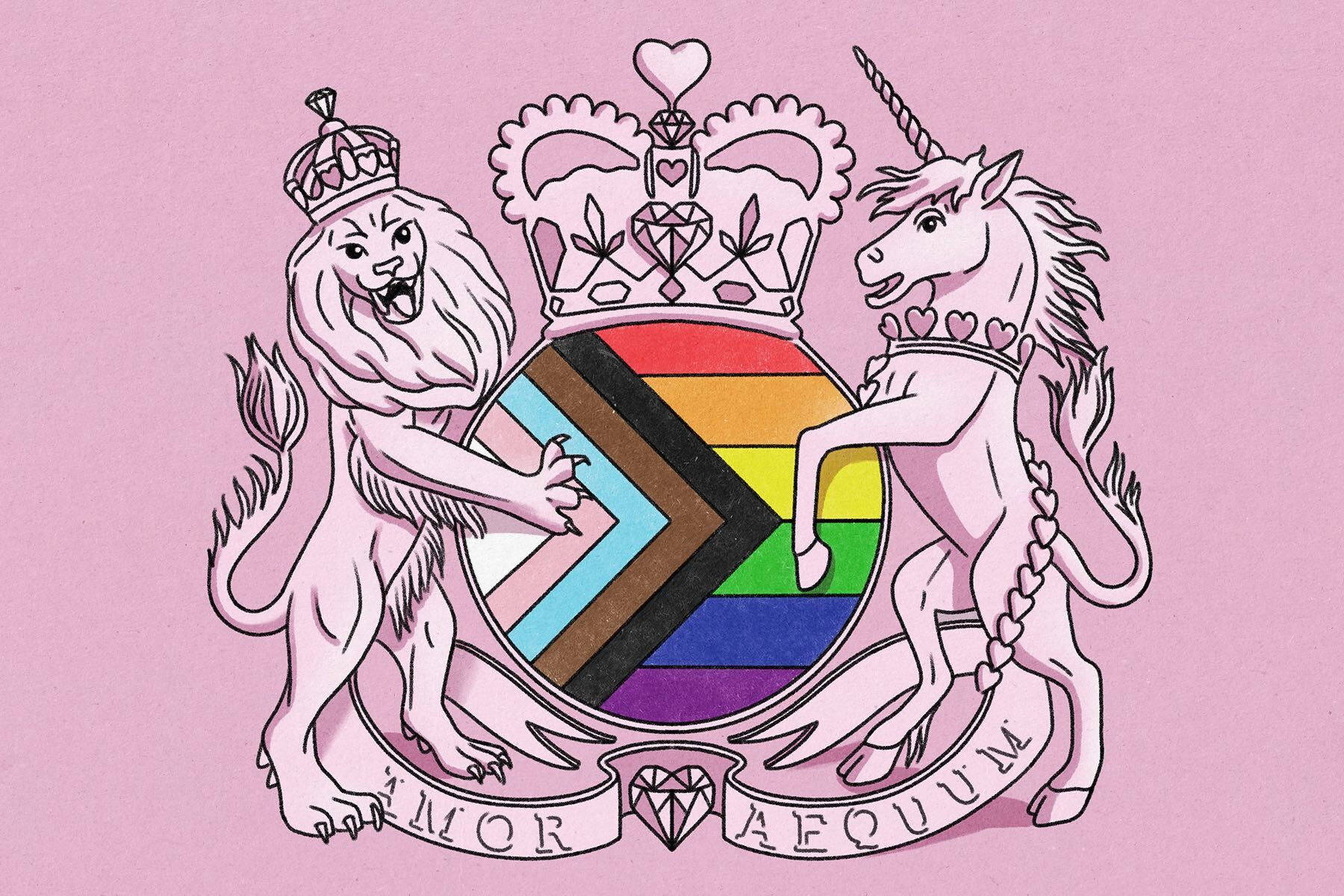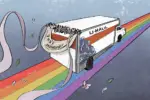Through stories featuring lion characters, the YouTube animated web series “My Pride” helps audiences reflect on issues of intolerance and heteronormativity in human society. Through the intricacies of its lion characters and their relationships, the show tackles the intersecting aspects of complex personalities, sexualities, laws and religions.
Pride Lore: Understanding Nothing’s World
“My Pride” is about the life of a young lioness named Nothing. The story is told from Nothing’s perspective and critiques how pride law and religious ties to their goddesses affect their lifestyle. Pride law outlines how goddesses play a role in the creation of prides, the roles lions and lionesses will have and the ideologies of heteronormative behavior.
Pride law is established as the foundation by which all lion prides should live. It is coupled with a legend relating to the lions’ religious views, establishing roles for the three goddesses and the birth of pride law itself. As Episode 1 establishes, pride law was formed when the great kingdoms fell. These kingdoms refer to Sunce, goddess of the sun, Cansu, the goddess of storms, and Azra, goddess of the moon.
The kingdoms fell into disarray after the goddess’ chosen lions became subjects of a war. This war caused the kingdoms to become so divided that Sunce’s chosen lion created pride law to ensure that history would not have another blunder. The creation of pride law establishes the idea of heteronormative roles. For males, their role is to defend and protect the pride, while females are hunters and continue their male’s bloodline to ensure the future of the pride.
These aspects make the heteronormative narrative very clear. Each gender has a role that must be fulfilled to ensure their pride’s survival. Those who do not fit within these roles are outcasted and become prideless, which makes survival difficult for them. Prides use names to establish these clear rules. Males, or manes, do not become manes until they rule a pride of their own, while females are nameless until they take their huntress exam.
Heteronormative Behavior Is All in the Names
Main character Nothing was almost killed by a no-mane as a cub, and subsequently, has both a noticeable scar on her eye as well as a broken leg. In nature, a broken leg is a death sentence for lions; however, she is protected by the goddesses. This protection ensures her and her brother’s survival into adulthood. Her mother, a huntschief named Powerstrike, cruelly names her “Nothing” as a reminder of the skills she presents to the pride after she fails her assessment.
Nothing’s name is a shackle of the heteronormative lifestyle of pride law. Nothing’s name is a mark, a reminder of the skills she lacks, a reminder of how her pride views her usefulness. This name chains her to the duties and responsibilities of the pride. Males are born with names, but it’s only half of a name. They don’t earn their “mane” until they rule their pride.
These pride rules are an allegory for heteronormative narratives. Their establishment defines the normative rules within a pride and any deviation outside of these structures is considered abnormal, irregular or deviant. Names within a pride define lions’ roles, create meaning for them, a duty to the society in which they live and thus, create a discourse of structure.
Homonormative Narratives in those who are Prideless
Those who do not fit this pride law structure are ridiculed, disrespected and hated. This is especially true for prideless lions, who have names that do not fit within pride structure. Hover, another lioness, is self-named. Other members of Nothing’s pride, like her mother and grandmother, express a strong dislike for her because she isn’t part of a pride and is generally disrespectful. Hover’s reluctance to follow tradition acts as clear defiance of the norms displayed throughout the series.
Nothing and Hover’s relationship follows a similar course. In addition to being rejected by pride law and pride society, as indicated by her name, Nothing’s sexual preference is also questioned throughout the series. Her relationship with another lioness is forbidden because it serves no role in continuing the future of the pride.
These notions of being against the grain are something the characters are born into. Characters such as Powerstrike, Silent Stalk and Far Leap are all born into the pride’s society alongside Nothing. Powerstrike, Nothing’s mother, begins as a strict and cruel lion bent on maintaining the pride’s normality, to changing her mind after Proundmane threatens Hover, the lioness her daughter loves. Understanding the love and the bond that Hover and Nothing share pushes Powerstrike to leave the pride in search of her child, and hopefully make things right.
Far Leap also leaves the pride with Hover and Powerstrike to find Nothing. It hasn’t been explicitly stated whether or not Far Leap has feelings for Hover, but it is heavily implied. This implication is something she hid from the rest of the pride. Her sister, Silent Stalk, chooses to stay behind, saying that her role, and the role of all lionesses, is to be there for their manes, serving their needs.
The prideless lions and lionesses live free but struggle to survive because their lifestyle doesn’t revolve around relationships with other lions. But choosing to live free of the constraints of society’s rules comes with consequences — evident in the struggle to find food, shelter and water. A life of living freely can be difficult to find meaning in when the world itself isn’t conducive to survival.
The Road to Recovery is One Paved in Love
Maddi Patton, the show’s creator, was kind enough to tell me about how she created her Patreon-funded passion project. According to Patton, the web series is meant to encourage inclusiveness, using pride law as a stand-in for societal values.
“I wanted Pride Law to be a stand-in for all sorts of ‘Traditional Value’ standpoints on things like women’s rights, masculinity, sexuality, and ableism,” Patton says. “I wanted to highlight how insane and baseless all these rules are and explore how much needless suffering they create when we allow them to fester.”
As Nothing experiences life in and outside of a pride, she can see firsthand how difficult life can be for lions who are prideless. According to Patton, understanding the toxicity of a culture and refusing to participate can be difficult to maintain as a long-term solution.
“The Prideless live free of a toxic culture, but they pay for that with lack of access to food and water, never having a home and never being able to stay in one place,” Patton says. “The cost of freedom is so heavy that it acts as a way to keep Pride Lions in line.”
While these challenges don’t deter Nothing from her goals of survival, it does have a lot to offer her in terms of learning about the limitations of love and self-acceptance as a replacement for societal acceptance.
Patton remarks that “Pridelessness is a half-measure, the only true solution is dismantling Pride Law entirely, tearing down the old laws and building new ones that serve rather than oppress, and include everybody. That’s the lesson I wanted Nothing to learn having lived both in a Pride and outside of one. I think for her, growing up is accepting that and taking action to change it.”
Nothing’s journey of love and self-acceptance is really just beginning. Patton’s dedication to love, acceptance, and change are clear throughout her project, as shown through the nuanced characterization she wrote into the script. Maddi Patton’s world of inclusiveness, love and forgiveness has created a beautiful place for people looking to discover and accept these qualities within themselves and the world around them.
A band of lions and lionesses experiencing a journey of change and forgiveness highlight aspects that play into a bigger picture — a more loving future. While the contrast between two very different worlds might seem miles apart, the world does become larger when it is more inclusive for others, regardless of how they live. With a little luck and a lot of love, “My Pride” could set the stage for inclusivity, love and a light that is not only worth watching but also worth experiencing.

















